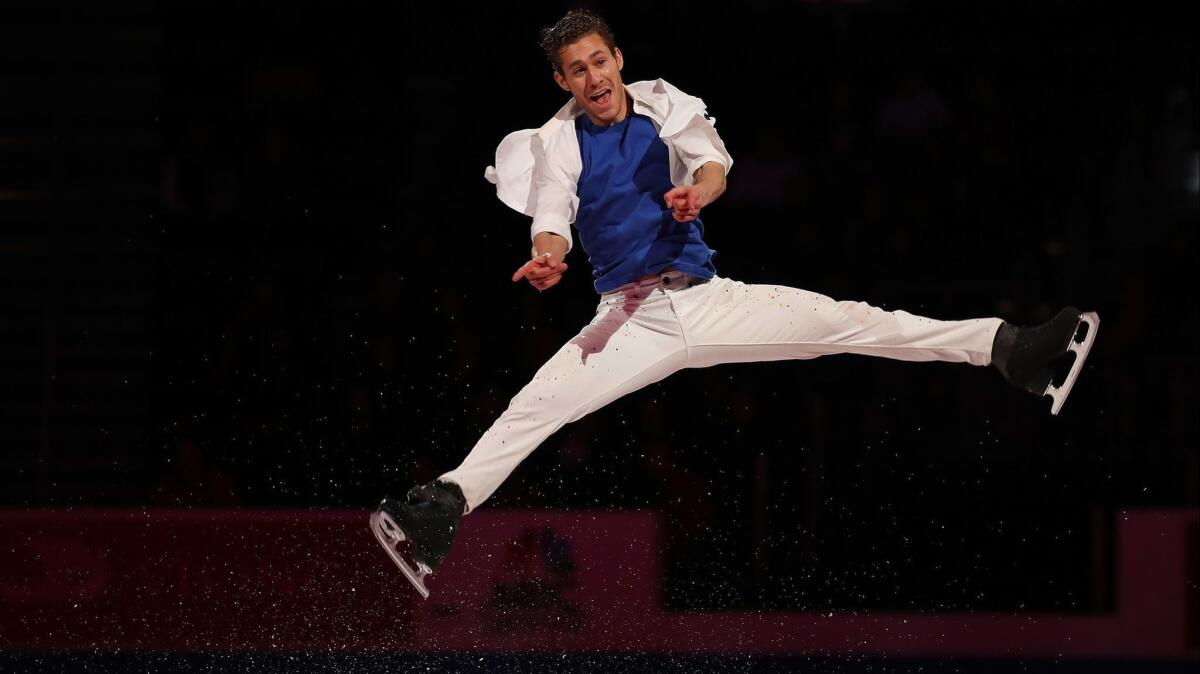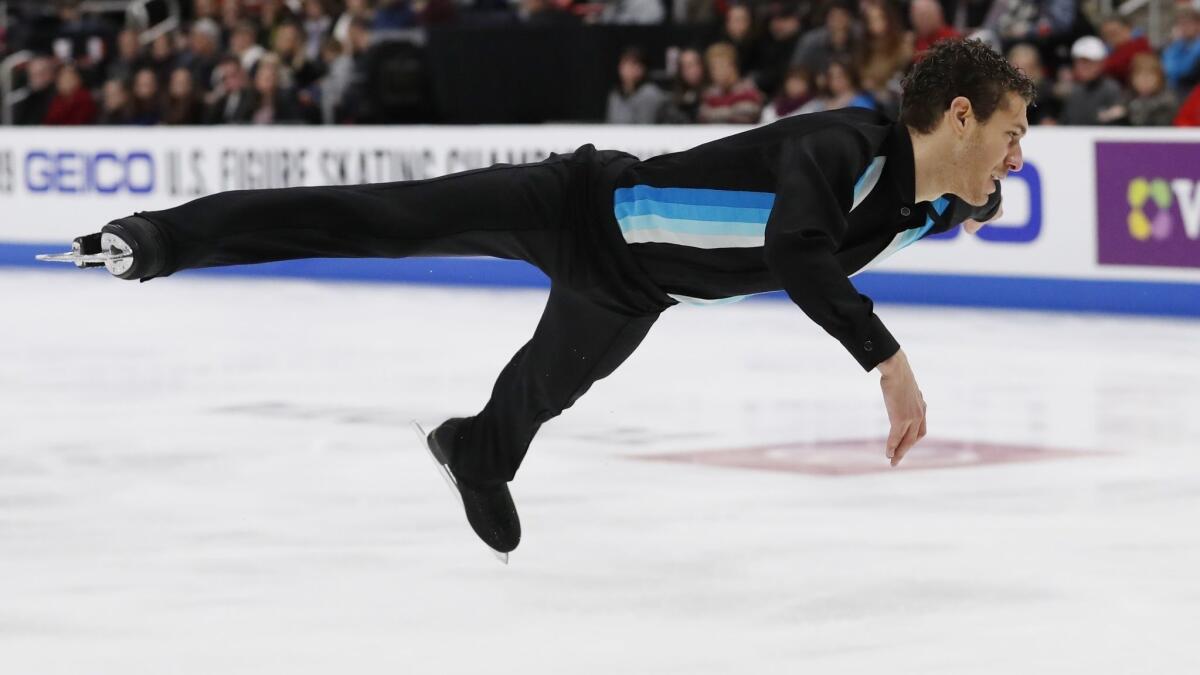Column:: Jason Brown aims to revolutionize his figure skating career by landing a quad in competition

- Share via
For most of his figure skating career, Jason Brown has glided along the frontier of the battle between athleticism and artistry, a debate that has intensified as more and more skaters casually pull off dazzling quadruple jumps.
When done well, quadruple jumps are marvelous blurs of body, blade and bravery. They earn piles of points, and they advance the sport. Without athletes pushing the limits, it’s an ice show, not a competition. But when done poorly, quads can be awkward and shatter the mood a skater tries to create in a program. Splat-fests are almost as uncomfortable for fans as they are for skaters who can’t smoothly pull off those four-revolution jumps.
Brown, who contributed to a team bronze medal for the U.S. at the 2014 Olympics, has never cleanly landed a quad in competition, though he hopes to change that during the Four Continents Championships this week at Honda Center. His fluid skating, tight spins and deft footwork make a persuasive case for highly valuing artistry, and fans swoon over his born-to-do-this performances. But his entrancing abilities usually aren’t enough for him to outscore the teenager-dominated quad squad.
If he doesn’t land a quad, he probably won’t win a major title. If he tries one and misses, he risks ruining the spell he weaves for appreciative audiences. It’s a push-pull he’s still working through a year after he missed a berth on the U.S team for the Pyeongchang Olympics and hit a career crossroads.
Brown, 24, emerged from a rest determined to conquer the elusive quad and get a fresh start. That led him to leave longtime coach Kori Ade last year to work in Toronto with two-time Olympic medalist Brian Orser, now a premier coach. “I think I was at that point where I was a little bit burned out and I needed to step away,” Brown, who finished third at the 2018 Four Continents event, said by phone last week. “Fortunately or unfortunately having my last season end as abruptly as it did, I took about six weeks off and I went to Palm Springs with my parents a little bit to get away. I went to New Zealand with my sister. I really was able to step away from the sport and get away from all the pressure that everybody is dealing with. It gave me the clarity and it gave me excitement to come back to it.
“I’m very proud of everything I’ve accomplished in the sport and I’m very proud of the career I’ve had thus far, and my career in general. But I just knew there was more that I could physically do, and there was more that I knew I could accomplish as far as achieving my potential. I knew I could be an even better skater than I was.”
The next step would be to land a quad in his Four Continents long program. He landed several in practice at the U.S. championships and planned to do a quadruple salchow but in his free-skate program “popped” it and did a double instead. He dropped from second after the short program to finish third behind three-time champion Nathan Chen and Vincent Zhou, and all three will compete at the world championships in Saitama, Japan, in March.
Chen is skipping Anaheim because he’s studying at Yale, leaving Zhou, Brown and Tomoki Hiwatashi — who finished fourth at the U.S. championships — to compete here. They’ll face a field that features Olympic silver medalist Shoma Uno of Japan and defending Four Continents champion Jin Boyang of China, who was fourth at the Olympics and is a two-time world silver medalist.
Figure skating’s scoring system was amended before this season to permit judges to more generously reward a good jump, spin, or footwork sequence. The previous scale for grade-of-execution points was plus-three to minus-three, but judges can now add up to five points for exceptional technique. That has boosted Brown’s totals, and he was thrilled to crack 100 points in the short program at the U.S. championships. The changes, he said, “really value quality. … They’re really pushing quality for this new judging system so it allows people who might not have the technical difficulty or as difficult of a technical program to maximize what they can do to get the points.
Sign up for our daily sports newsletter »
“It’s proven to really help in my short program because there’s less elements in them. In the free program, where people do so many quads, it’s still sometimes difficult to make up points, and you have to be nearly perfect to continue that. I think in my short program I was able to pick up 15 extra points by just the quality of my elements.”
Brown has had some ups and downs this season while revamping his jumping technique. He finished sixth at Skate Canada, the first of his two Grand Prix Series assignments, and then led the Grand Prix event in Grenoble, France, after the short program. His nearly 10-point lead over Chen turned into a 15-point deficit and a second-place finish when Chen performed three quads. Brown won a Challenger Series event in Zagreb, Croatia, but many top skaters were missing while they competed in the Grand Prix finale. “As the season has gone on,” he said, “I’ve gotten more strong and confident.”

A good showing this week would prepare him well for the world championships, and beyond. “For me, it’s another steppingstone,” he said. “This year, being that post-Olympic season, it’s really about building the base that will carry you on for the next couple years. Because you know as you get closer to the Olympics, the pressure will get bigger and hype will continue to rise. Four Continents is really an opportunity to get those programs out there, to get another time competing before the world championships and to really work out those kinks and take what I learned from nationals and really apply it.”
For him to keep up, that means finally and cleanly landing a quad.
Follow Helene Elliott on Twitter @helenenothelen
More to Read
Go beyond the scoreboard
Get the latest on L.A.'s teams in the daily Sports Report newsletter.
You may occasionally receive promotional content from the Los Angeles Times.






